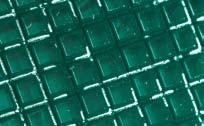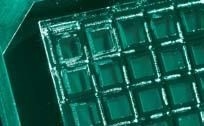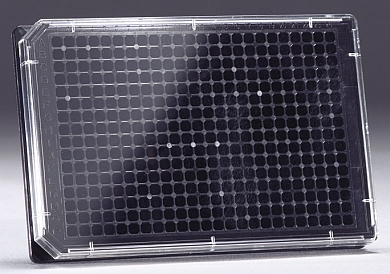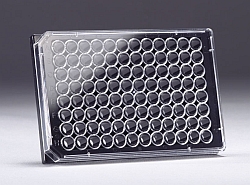Overview : Assay Plate Range
Product informationPrinciple
The Assay Plate™ has been designed for high content screening (HCS) assays in drug development and related areas. It is also suitable for homogeneous assays employing fluorescence intensity, FRET and TR-FRET where measurements are bottom-read. This high quality optical base plate assures the necessary accuracy and consistency for automated high throughput systems, generating optimum signal to noise ratios. Using state-of-the-art manufacturing technology 4titude® has developed a product which offers several key advantages to the end user.
| Assay Plate 384 384well plates for cell based content screening with improved cell adherence and optimum signal to noise ratio. |
||
| Assay Plate 96 96well plates for cell based content screening with improved cell adherence and optimum signal to noise ratio. |
||
 |
Assay Plate 24 24well plates for cell based content screening with improved cell adherence and optimum signal to noise ratio. |
Laser Welding Technology
4titude’s Assay Plates™ are assembled using unique patented laser welding technology. The use of localised welding heat dramatically reduces base film distortion during production. This improves base flatness, which in turn reduces instrument auto-focusing time.
Optical Quality of the Polymer Film
 The clear base component of our Assay Plate™ demonstrates superior properties in terms of optical clarity (low absorbance and high transmission), low background fluorescence and consistency of material thickness. The latest extrusion technology is used for manufacturing an ultraclear base of 150µm in thickness to provide optimum results with confocal microscopy and laser based detection systems. Variation across the plate is minimised so the time needed for complex screening applications can be reduced dramatically. In addition, cell plate types are avaialble with a 700µm moulded base. This feature further improves the plate flatness and is critical for certain confocal readers, such as the IN Cell 3000.
The clear base component of our Assay Plate™ demonstrates superior properties in terms of optical clarity (low absorbance and high transmission), low background fluorescence and consistency of material thickness. The latest extrusion technology is used for manufacturing an ultraclear base of 150µm in thickness to provide optimum results with confocal microscopy and laser based detection systems. Variation across the plate is minimised so the time needed for complex screening applications can be reduced dramatically. In addition, cell plate types are avaialble with a 700µm moulded base. This feature further improves the plate flatness and is critical for certain confocal readers, such as the IN Cell 3000.
Reduction of Autofluorescence
 4titude’s Assay Plates™ are assembled using unique patented laser welding technology which reduces autofluorescence and does not inhibit cell growth. other competitors assemble clear base microplates by gluing a clear film to the frame or heat-welding the components together. Both techniques can cause problems with cell growth and the subsequent microscopic or fluorometric analysis.
4titude’s Assay Plates™ are assembled using unique patented laser welding technology which reduces autofluorescence and does not inhibit cell growth. other competitors assemble clear base microplates by gluing a clear film to the frame or heat-welding the components together. Both techniques can cause problems with cell growth and the subsequent microscopic or fluorometric analysis.
Heat welding of the two plate components under high pressure results in autofluorescence at the well edges called “halo effect”. Gluing uses organic solvents within the adhesives, which can also cause autofluorescence. These solvents can also have cytotoxic effects, which may lead to inhibition of cell growth or even cell death. Additionally, incomplete glue lines or weld lines often result in well-to-well leakage.
 |
|
Assay Plate™ 384 showing ripple-free bonding of frame and base |
 |
Competitor's plate showing areas with no adhesive | |
 |
Competitor's plate showing adhesive ingressing into plate wells |
Improved Cell Adhesion
 Polymers such as polystyrene are very hydrophobic and need to be surface treated to increase wettability and to allow for cell adhesion. To introduce the necessary charges to the plastic surface screening plates are commonly undergoing corona treatment or similar low cost modifications. The drawbacks of such treatments are that they are partly reversible and that the density of the charges varies across the surface area, resulting in uneven cell growth and a short shelf life of the products.
Polymers such as polystyrene are very hydrophobic and need to be surface treated to increase wettability and to allow for cell adhesion. To introduce the necessary charges to the plastic surface screening plates are commonly undergoing corona treatment or similar low cost modifications. The drawbacks of such treatments are that they are partly reversible and that the density of the charges varies across the surface area, resulting in uneven cell growth and a short shelf life of the products.
4titude uses a unique low pressure plasma process for treating the plastic surface which produces a more consistent and stable surface. The treatment has been especially designed to improve cell adhesion under difficult conditions (e.g. reduced serum conditions). It is also useful for growing cells with low adhesion properties such as transfected cells overexpressing proteins.
Collagen 1
Collagen 1 is a protein of the extracellular matrix (ECM), an intercellular substance which, in vivo, influences adhesion, migration and proliferation among other processes. Collagen 1 is one of the most important ECM proteins for in-vitro cell cultures. Difficult to cultivate cells adhere to Collagen 1 and display positive growth. Collagen 1 can also influence differentiation and morphology.
Poly-D-Lysin
Poly-D-Lysin is a synthetic molecule that improves the adhesion of different cell types to polystyrene surfaces. it can improve cultivation efficiency of individual cell lines especially when serum-free or serum-reduced medium is used, or when experiments such as transfections are performed.
No supporting documents available
This product has no supporting documents available for download. If you feel like supporting documents should be available for this product, please contact us.

